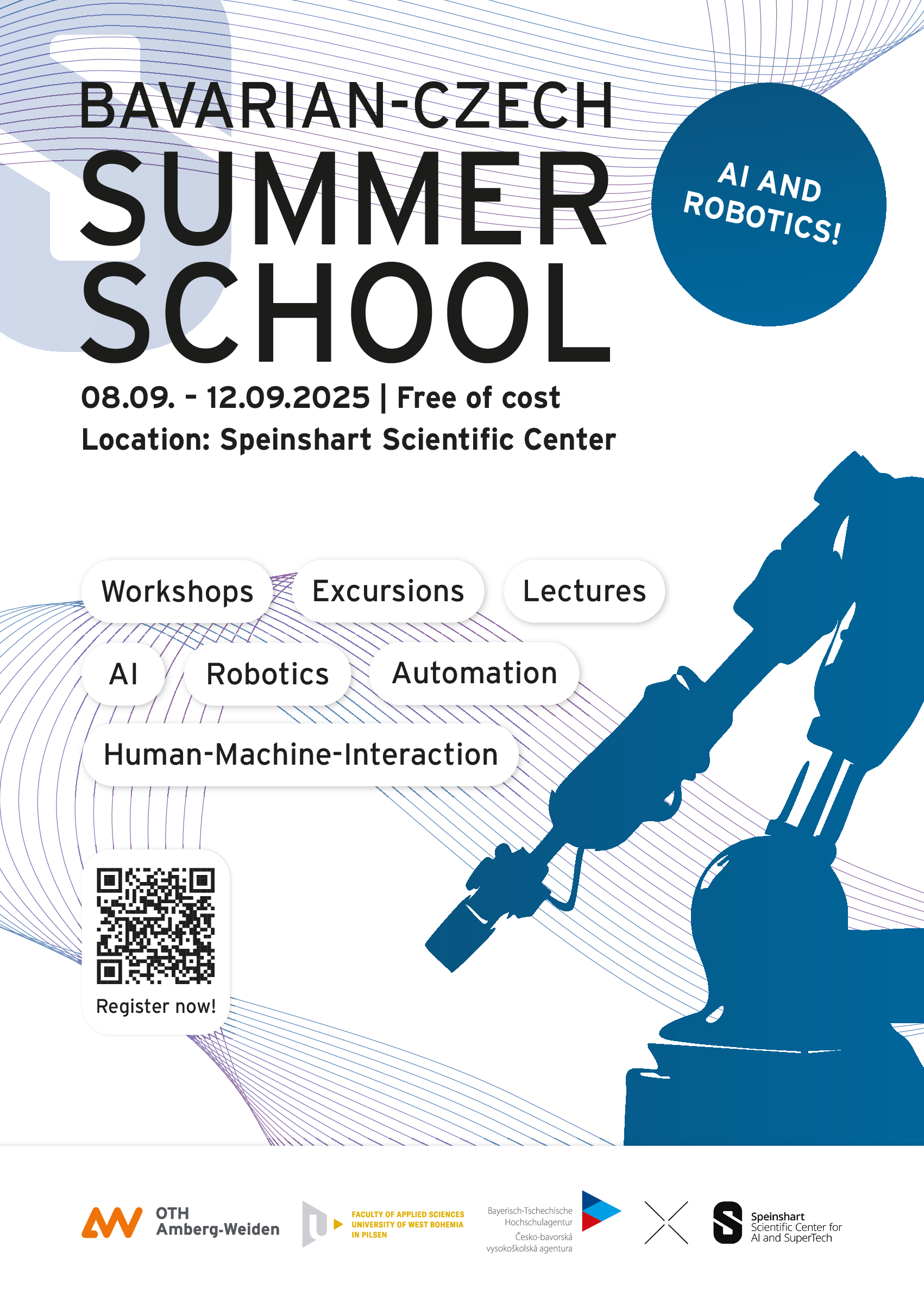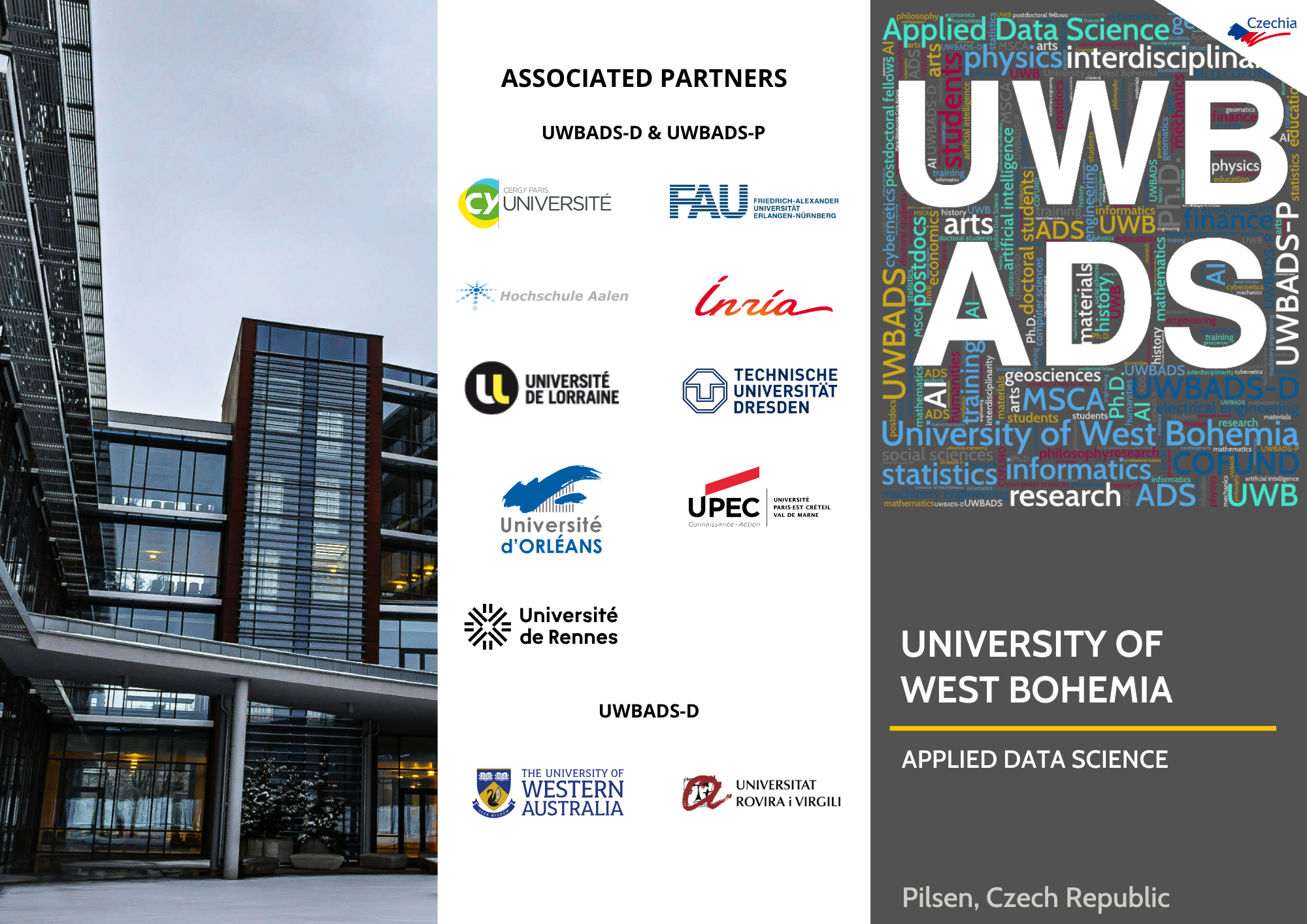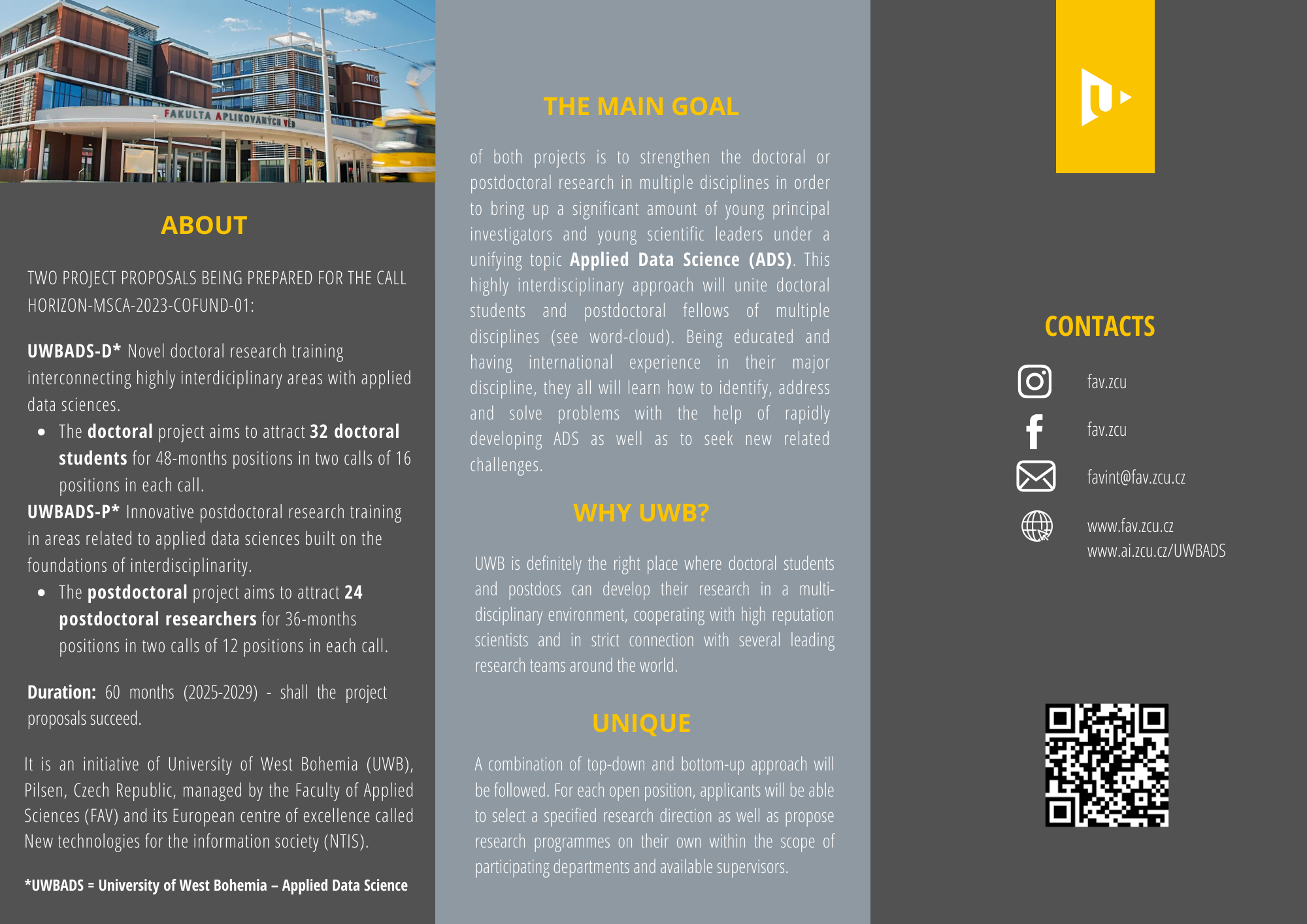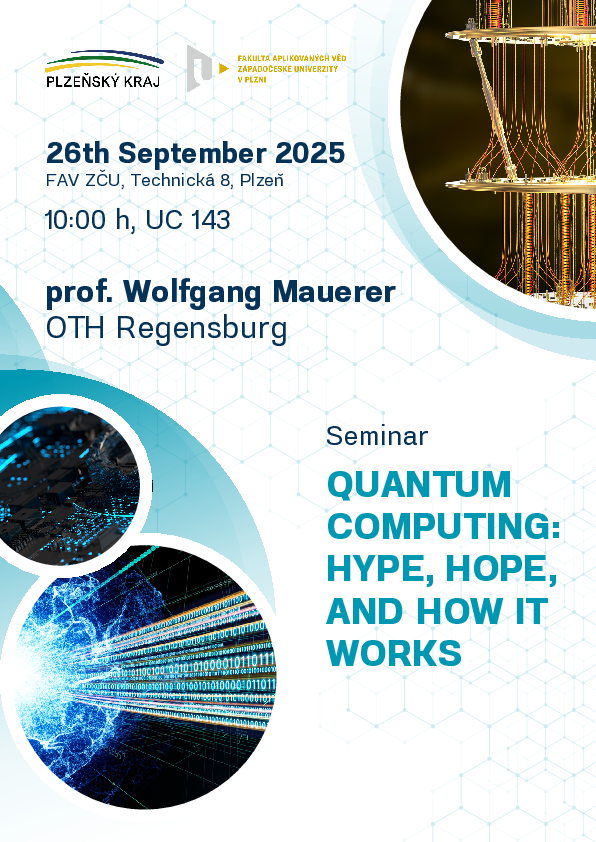AI Tea Talks is a seminar and discussion series related to artificial intelligence, applied data science, machine learning methods, deep neural networks and other similar topics. It runs bi-weekly at the University of West Bohemia at different locations, usually on Fridays after lunch with approx. one-hour talk followed by an informal networking and discussion. A variety of teas will be provided. The language of communication is English unless all participants speaks Czech fluently.
Seminar group list
Join our [ai-tea-talks-list] to receive regular seminar invitations. The seminar and the group membership is open to everybody.
Other AI activities at UWB
In April 2023, University of West Bohemia in Pilsen established a working group on artificial intelligence. Activities of this working group as well as other news, invitations, frequently asked questions, recommendations for students, teachers, researchers and management as well as links to other working groups are available in Czech at the official "signpost" web AI na ZČU (AI at UWB).


Past Talks and Events
Name: Bavarian-Czech Summer School - AI in Robotics
| 8-12 September 2025 | |
| Scientific Centre for AI and SuperTech (speinshart.ai), Speinshart, Bavaria | |
|
Call for participation: here Suitable especially for: undergraduate, graduate and doctoral students with interest in AI and robotics Practical "hackathon": Human-Machine-Interaction, in particular with Niryo, The Ned2 Language: English Cost: Free of charge for participants (including travel, accommodation and full board) Registration deadline: 1 August 2025 |
|
 |
Václav Šmídl, Blanka Šedivá: AI workshop: Hands on analysis of the real-world data
| Friday, December 6, 2024, 14:00 | |
| RICE, FEL ZČU, small meeting room on the 2nd floor. | |
Courtesy of our colleagues from RTI, we have a real dataset to analyze. The details are in the github repo. The plan for this week is to start with an interactive copilot-based session to generate code for:
|
Václav Šmídl: AI workshop: How to train your neural network
| Friday, November 22, 2024, 14:00 | |
| RICE, FEL ZČU, large meeting room on the 4th floor. | |
We have prepared an interactive workshop as a hands-on introduction to deep learning. Due to an abundance of tutorials on the internet, we do not want to provide yet another tutorial but promote a deeper understanding of practical issues. Tutorial is suitable not only for someone
|
Lukáš Adam: Practical optimization: the importance of proper formulation
| Friday, May 17, 2024, 13:00 | |
| RICE, FEL ZČU, large meeting room on the 4th floor. | |
| In this talk, I will be more focused on classical optimization than modern methods used in AI. My main goal will be to introduce existing different subfields of numerical optimization and demonstrate that a proper problem formulation may often provide more benefits than newest solvers. I will show several specific problems I participated on in the past and will convey my personal experience of what worked and what did not while solving them. These problems range from relatively simple linear optimization problems to difficult combinatorial optimization problem. |
Lukáš Picek: Snake species and fungi identification
| Friday, April 12, 2024, 13:00 | |
| FAV/NTIS, meeting room UC143 (ground floor, orange part of the building, close to the dean's office). | |
| Developing an effective automatic system for snake species identification is essential for biodiversity monitoring, conservation, and global health. The SnakeCLEF and FungiCLEF challenges provide an evaluation ground that helps track the performance of AI-driven methods for snake species recognition systems on a global scale. The fifth edition of the SnakeCLEF and the third edition of FungiCLEF challenges focus on the (i) evaluation of gradual improvements in automatic snake/fungi species identification and (ii) evaluation in scenarios with uneven costs for different errors, such as mistaking a venomous/poisonous species for a harmless/edible one. In our talk, we will showcase the vital role of robust automatic identification systems for snakes and fungi, particularly in regions with limited resources, and highlight the potential impact on biodiversity conservation and global health outcomes. Besides, we will provide (i) a comprehensive description of the provided data, (ii) an evaluation methodology, and (iii) baseline methods/approaches. |
Serge Pacome Bosson: Implementation of Deep NN on embedded hardware
| Friday, April 5, 2024, 13:00 | |
| RICE, FEL ZČU, large meeting room on the 4th floor. | |
| Recent years have seen remarkable advances in artificial intelligence (AI) technology. One area of particular interest that has gained prominence is embedded AI, which refers to the integration of AI capabilities into embedded systems, such as microcontrollers, systems-on-a-chip (SoCs) or dedicated industrial hardware. This enables these devices to perform intelligent tasks locally, without relying on cloud-based processing or external connectivity. In this talk, we will explore the concept of embedded AI, its benefits and some of the common architectural approaches used to implement this transformative technology. We will also share our results regarding the implementation of approximation functions based on machine learning algorithms that admit efficient implementation in hardware (i.e. MLP, 1DCNN, PWA and Lattice LUT). These approximators can find practical applications in electrical engineering such as flux link approximation, online fault diagnosis, AI robotics, advanced control in power electronics and drives, optimization problems, etc. |
Bonus intermezzo talk by Jan Pospíšil: From constant to stochastic volatility: a journey through financial modelling
| Friday, March 22, 2024, 13:00 | |
| FAV/NTIS, meeting room UC143 (ground floor, orange part of the building, close to the dean's office) and online. | |
| Fifty years ago, a pricing equation and its solution called the Black-Scholes-Merton formula revolutionized finance, leading to rapid growth of markets and stimulating quantitatively oriented minds. Their Nobel Prize-winning model undoubtedly revolutionized derivatives pricing and risk management. Their elegant framework not only reshaped the financial landscape but also inspired generations of both academics and practitioners. However, through time, its simplicity became a liability -- and yet its legacy persists. Nowadays, their original modelling assumptions are deemed simplistic and new, more complex models emerged that are better equipped to reproduce the real market data properties. These models typically allow more general movements of the underlying asset price than does the Black–Scholes-Merton dynamics. Traders can now choose to work with models that have stochastic (random) volatility, ones with ‘rough’ volatility or those involving jumps in asset-price movements, to name just a few. In this talk, we briefly introduce important volatility modelling tasks such as Monte Carlo simulations, solving pricing partial integro-differential equations, calibration of the models to real market data, robustness and sensitivity analyses. The results of the author and his co-authors obtained in these areas within the last decade will be briefly summarized and commented. |
Marek Hrúz: Introduction to Transformers
| Friday, March 15, 2024, 13:00 | |
| FAV/NTIS, meeting room UC143 (ground floor, orange part of the building, close to the dean's office). | |
| In this lecture, I will describe the basic principles of Transformer models; The architecture, the flow of information through the model, and explain the difference between a Transformer Encoder and a Decoder. The functionality will be explained on the task of translation. Next, I will show the derivations of the model for the tasks of computer vision, namely - classification and detection. |
Lukáš Adam: Using deep learning to recognize individual animals in images
| Friday, March 1, 2024, 14:00 | |
| RICE, FEL ZČU, large meeting room on the 4th floor. | |
| I will talk about my work on animal re-identification, that is recognizing individual animals in images. The first part will provide an overview of SeaTurtleID (a new dataset of 400 loggerhead sea turtle individuals collected in the wild over more than 10 years), WildlifeDatasets (open-source Python library for managing animal re-identification datasets) and MegaDescriptor (pre-trained deep learning model for animal re-identification). In the second part, I will focus more on the technical details of various methods used for training MegaDescriptor. |
Aleš Pecka, Václav Heidler: Deep learning in CFD
| Friday, February 9, 2024, 13:00 | |
| FAV/NTIS, meeting room UC143 (ground floor, orange part of the building, close to the dean's office). | |
| Computational Fluid Dynamics (CFD) is a field that deals with methods for the numerical simulation of fluid dynamics. The main challenge is the high computational cost of numerical methods, which significantly limits the range of problems that can be solved. Much effort is devoted to developing simplified numerical methods and fluid models that allow faster calculations without significantly affecting the obtained numerical solutions. In recent years, neural networks have also been used for predicting the flow field. These networks learn to predict solutions for various geometries and flow parameters based on precomputed data. After training, a neural network can predict the flow field several orders of magnitude faster than traditional CFD numerical methods. In this presentation, we will show the prediction of a stationary flow field around an airfoil and in a cascade of blades. Furthermore, we will demonstrate the application of a neural network in an unsteady problem involving an oscillating cylinder. Finally, we will present the architecture of a neural network for training based on differential equations, which will be used for the stationary flow problem in a channel. This is a joit work with Ondřej Bublík and Jan Vimmr |
AI Tea Party - Pre-Christmas Gathering
| Wednesday, December 20, 2023, 13:00 | |
| EP110 - lecture theater at the Faculty of Electrical Engineering | |
| During this informal festive meeting we reviewed the AI and data science related projects that we all either work on or plan to work on in the near future. We had amazing 35 spotlight talks and afterwards a fruitful informal discussion about open issues and problems that different teams at UWB are trying to solve either in running funded projects or as part of their basic or applied research. By this activity we believe that we finally broke the inter-departmental and inter-faculties waves and unleashed the power of collective intellect and gave an impulse to start working together on something interesting. |
Antonie Brožová: Analysis of Blind Image Deconvolution based on Deep Image Prior
| Friday, December 8, 2023, 13:30 | |
| RICE, FEL ZČU, large meeting room on the 4th floor and online via Google meet. | |
| Deep image prior is a state-of-the-art approach to blind image deconvolution, yielding naturally looking images due to a well-chosen neural network structure. It significantly outperforms classical methods in terms of average PSNR, at the price of other drawbacks. The focus of this seminar will be on an explanation of the benefits of DIP in BID and the analysis of other aspects of DIP-based BID algorithms (initialization, optimization method and regularization by traditional sharp-image priors). Several versions of deep deconvolution methods will be studied via metrics designed to distinguish different types of solutions. |
Václav Šmídl: Gentle introduction to inverse problems
| Friday, December 8, 2023, 13:00 | |
| RICE, FEL ZČU, large meeting room on the 4th floor and online via Google meet. | |
| This talk aims to introduce tools and approaches used in solving inverse problems on the undergraduate level using high-school mathematics. The concepts will be illustrated on primary-school examples via interactive graphics. Throughout the talk, I will walk through topics like optimization, regularization, sparsity, and Bayesian regularization. Ultimately, these tools are demonstrated in the classical approach to Blind Image Deconvolution. |
Jan Lehečka: Speech Recognition Systems Using Wav2Vec Models
| Friday, November 24, 2023, 13:30 | |
| FAV/NTIS, meeting room UC143 (ground floor, orange part of the building, close to the dean's office). | |
| Speech recognition systems are an essential part of many AI tools, such as dialogue systems, home assistants, captioning systems, etc. Motivated by the recent success of Transformer-based language models (such as BERT or ChatGPT), a similar model architecture was successfully adopted also into the speech domain, leading to a new revolutionary generation of speech recognition models. One of the most successful members of this generation is Wav2Vec 2.0. In our recent work, we have developed our own version of the Wav2Vec 2.0 model specifically for Czech and successfully deployed the model into many AI systems. In challenging speech recognition tasks, our models significantly outperform much larger multilingual models (such as Whisper) while scoring new state-of-the-art results. This talk aims to present our Wav2Vec 2.0 models as well as share our results, experiences, and challenges. |
Christian Rute and Jan Šimek: Exploring Pitfalls and Weaknesses of Principal Component Analysis (PCA)
| Friday, November 24, 2023, 13:00 | |
| FAV/NTIS, meeting room UC143 (ground floor, orange part of the building, close to the dean's office). | |
| A students' project: In this talk we explore the limitations and vulnerabilities of the principal component analysis (PCA) as a statistical technique widely used in various fields. This work aims at enhancing researchers’ awareness of the strengths and weaknesses of the PCA, contributing to more informed data analysis practices. |
Martin Bulín: Searching Extensive Archives Using AI Methods
| Friday, October 27, 2023, 13:30 | |
| FAV/NTIS, meeting room UC143 (ground floor, orange part of the building, close to the dean's office). | |
| The importance of history archives in preserving and understanding past experiences is counterbalanced by the challenges encountered in accessing and searching through them, primarily due to their extensive size and the diverse demographics of the speakers. In collaboration with institutions responsible for the digitization and preservation of historical audio/video recordings and scanned documents, we successfully demonstrate the use of AI methods for searching in extensive data collections. We utilize our own technologies for speech-to-text conversion (ASR) and text extraction from images (OCR). Recently, we've extended our foundational key-phrase search engine to encompass natural language input, yielding a list of the most relevant passages based on their semantic similarity. Through web user interfaces, we enable archivists and the general public to search through thousands of hours of recordings and millions of pages of scanned documents in real-time. |
David Pánek: Synthesis of Digital Antenna Array Beam Forming
| Friday, October 6, 2023, 13:30 | |
| RICE, FEL ZČU, large meeting room on the 4th floor. | |
| As wireless communication, radar, and satellite systems continue to evolve, enhancing beam-forming capabilities is becoming more important. Although we now have the potential for fully digital control of the beam, synthesis methods remain not fully developed. This talk aims to share our insights and experiences with optimization techniques and artificial intelligence to address the beam-forming problem. |
Abbas Talimian: Real-time injury assessment in non-standard seating configurations in highly automated vehicles
| Friday, June 9, 2023, 13:00 | |
| FAV/NTIS, meeting room UC143 (ground floor, orange part of the building, close to the dean's office). | |
| Traditional human-driven vehicles are going to be replaced by highly automated vehicles as one of the future mobility trends. Although highly automated vehicle active safety systems can protect against vehicle-to-vehicle accidents, the traffic mix between human-driven vehicles and highly automated vehicles is still a potential source of vehicle collisions. Occupants in highly automated vehicles will just be passengers not dealing with driving anymore. There will be a huge number of complex non-standard seating configurations, which are not able to be assessed by hardware testing for critical situations or even crashes. The objective of our work is the development of a fast virtual approach to identify the injury risk in non-standard seating configurations under multi-directional impacts. We introduce a digital twin for the expected automated vehicle interiors. Non-standard seating configurations are represented by a simplified model of four seats located in the vehicle. These seats are occupied by a previously developed scalable human body model representing passengers of variable anthropometry. Thanks to the vehicle interior simplification and our hybrid human body model enabling fast calculation by combining a multibody approach with deformable elements, thousands of simulations describing the impacts are run. Based on the numerical simulations describing impact scenarios, an artificial intelligence model learns a digital twin to approximate injury risk predictions for a given scenario in real time. This is a joint work with Luděk Hynčík and Jan Vychytil. |
Jan Kaska: Bayesian Experiment Design for the Development of a Degradation Model
| Friday, May 26, 2023, 13:00 | |
| RICE, FEL ZČU, large meeting room on the 4th floor. | |
| In order to estimate the behaviour and lifetime of materials, a suitable degradation model is needed. Although this may seem like a relatively simple task, measuring a single point in the experimental space can sometimes take months. To find an appropriate model with a minimum of experiments, a Bayesian experiment design is used, where a probabilistic interpretation of linear models allows to calculate the information gain and as a result find the optimal aging setup. Moreover, this methodology can quickly discriminate between several candidate models. This approach will be demonstrated on an electrical insulating material found in most electric motors. |
Marek Hrúz: Hand Pose Estimation: Voxel to Voxel Representation
| Friday, May 12, 2023, 13:00 | |
| FAV/NTIS, meeting room UC143 (ground floor, orange part of the building, close to the dean's office). | |
| In this talk, I will present one of the state-of-the-art methods for hand pose estimation and show how we adopted it for egocentric recordings of hands interacting with objects. The task is to find 3D coordinates of individual joints of a hand observed by a depth-sensing camera. Egocentric hand pose estimation is mainly utilized in VR or AR applications but can be used for contactless control of devices or gesture/sign language recognition. The presented method is based on a voxel representation of the input and output. It uses a V2V PoseNet - a 3D CNN with an hourglass structure. We conducted thorough experiments with the architecture of the network and post-processing method which will be explained. With our modifications, we were able to achieve sota results in the HANDS 2019 challenge. |
Jakub Ševčík: Case Study: Neural ODE for synchronous drives
| Friday, April 28, 2023, 13:00 | |
| RICE, FEL ZČU, large meeting room on the 4th floor. | |
| Ordinary differential equations (ODEs) are key tools of scientific and engineering models that are often derived from the first principles. However, the resulting models may be inaccurate description of the real behavior since our knowledge of the equation is incomplete. Neural ordinary differential equations (NODEs) is a promising method of dynamic system identification combining differential equations and neural networks. In the talk, we will review the basic theory of NODEs, introduce how to scalably backpropagate through any ODE solver without access to its internal operations during training, and show what progress NODEs have made since the original publication in 2018. Moreover, we will show a practical application of NODEs in identification of precise dynamical model of a synchronous drive. Specifically, we approximate the flux linkage function in the ODE by a neural network, derive learning algorithm using automatic differentiation, and discuss the impact of various training strategies. We demonstrate that the method has significant improvements over classical look-up tables as well as recently proposed neural networks with radial-basis-function kernels. |
Jan Pospíšil: Universal Approximation Theorems – Precision Challenges
| Friday, April 14, 2023, 13:00 | |
| FAV/NTIS, meeting room UC143 (ground floor, orange part of the building, close to the dean's office). | |
| Universal approximation theorems (UATs) are results from the mathematical theory of artificial neural networks (ANNs) that state under which conditions feed-forward ANNs with single or multiple hidden layers are capable of approximating (typically continuous) functions to a specified (often arbitrary) degree of accuracy. Since these statements are often presented rather vaguely in many papers, we aim to give some light overview of different UATs and their implications. For all applied data science enthusiasts attending our AI Tea Talks we prepared three precision challenges two of them coming from mathematical finance. This year we celebrate 50 years since the publication of the famous papers by Fischer Black, Myron Scholes and Robert Merton on the valuation of options. Can ANNs today improve the old Nobel prize winning results? And if yes then how? |
Václav Šmídl: Active Learning: classical and deep approaches
| Wednesday, March 29, 2023, 13:00 | |
| RICE, FEL ZČU, large meeting room on the 4th floor. | |
| Standard supervised learning is improving with a growing number of available training data, which may be expensive to obtain. The compromise between the number of data and the quality of the resulting model is hard to find. Active learning is a strategy that starts with a smaller number of data and selects which data points will be most valuable for further development. It is closely related to classical techniques of experiment design and Bayesian optimization which will be also reviewed. Exetnsion of these ideas to models based on deep neural networks is now studied and our own findings will be presented in the second part of the talk. |
Michal Seják: Electrocardiograms as Fingerprints
| Friday, March 10, 2023, 13:00 | |
| FAV/NTIS, meeting room UC143 (ground floor, orange part of the building, close to the dean's office). | |
| Electrocardiography, commonly known as ECG, is a non-invasive diagnostic tool used to measure the electrical activity of the heart. This is achieved by placing electrodes on the skin that detect the electrical signals generated by the heart as it contracts and relaxes. I aim to discuss the utility of electrocardiograms (ECGs) as a unique identifier of an individual. Specifically, we will delve into the development and implementation of a model designed to determine whether two ECGs belong to the same individual. By analyzing the results of this model, we hope to elucidate the features and patterns that are most salient in distinguishing one individual's ECG from another's. We will also examine the potential implications of using ECGs as a biometric identifier, including its usefulness in medical record keeping and patient identification. Overall, my talk seeks to provide a comprehensive overview of the promise and limitations of ECGs as a tool for identifying individuals. |
Václav Šmídl: Bayesian Machine Learning for Shallow and Deep Models
| Friday, February 24, 2023, 13:00 | |
| RICE, FEL ZČU, large meeting room on the 4th floor. | |
| Success of recent deep models rely on availability of large corpus of the data. Learning with smaller data sizes typically leads to overfitting, poor generalization and extrapolation. Bayesian statistics offers a remedy of this problem in the form of theoretically justified framework. In this talk, I will provide brief introduction to the Bayesian theory. However, application of the theory is complicated by the need to solve complicated multidimensional integrals, which has to be approximated. I will provide an overview of computationally viable tools that are available for solving shallow and deep models. |
Václav Šmídl: Probability Density Learning for Heterogenous Tree Structured Data
| Friday, February 10, 2023, 13:00 | |
| FAV/NTIS, meeting room UC143 (ground floor, orange part of the building, close to the dean's office). | |
| Probability density learning is a well established field for fixed-dimensional data samples such as vectors or tensors. However, many real-world data are available in the form of structured files, such as JSON or XML. Our long term goal is to design a density learning method that can operate on such data. In the talk, we will start with demonstration of key challenges of this task and comparative study of existing methods for selected special cases. We will review sum-product networks as basis of our modeling approach and introduce its extension to heterogenous tree structured data. Specifically, we will: (i) describe density learning as a task, (ii) show comparison of existing methods for vector data, (iii) demonstrate difficulties of the problem for set data, (iv) compare methods for set data, and (v) present a first density learning method for heterogenous tree structured data. |
Václav Šmídl: Supervised Machine Learning: Basic Theory and Practical Experience
| Friday, January 27, 2023, 13:00 | |
| RICE, FEL ZČU, large meeting room on the 4th floor. | |
| The design of a new prediction or classification model becomes extremely simple due to the availability of free machine-learning toolboxes. However, if not used correctly, they can provide misleading results. In this talk, I will first introduce the basic theoretical concepts that are recommended for the design of ML models: cross-validation, hyper-parameter selection, calibration, and statistical model comparison. Second, I will comment on these concepts from a practical point of view using examples from personal experience with applications in plasma state classification, human motion estimation, and malware detection. In the remaining part of the talk, I will comment on the use/abuse of the methodology in the literature. I will conclude by summarizing the currently used protocol in our research group. |
How to get in touch?
Apart from the [ai-tea-talks-list] group, feel free to contact the main organizers: Kamil Ekštein, Jan Pospíšil, (both from the Faculty of Applied Sciences) and Václav Šmídl (from the Faculty of Electrical Engineering). Or you may use the form below to send us a message.
-
Meeting Rooms
RICE 4th Floor Meeting Room
Faculty of Electrical Engineering
Univerzitní 2795/26, Plzeň
GPS 49.7239206N, 13.3487767E
Meeting Room UC143
Faculty of Applied Sciences
Technická 2967/8, Plzeň
GPS 49.7268450N, 13.3524764E
-
Emails
Kamil Ekštein: kekstein@kiv.zcu.cz
Jan Pospíšil: honik@kma.zcu.cz
Václav Šmídl: vsmidl@fel.zcu.cz
-
Social
Send us a message...
UWBADS
UWBADS is an acronym for the University of West Bohemia (UWB) and Applied Data Science (ADS). This acronym is used in two project proposals that are now being prepared for the next HORIZON MSCA COFUND call.


Contacts
Mobility coordinator of the Faculty of Applied Sciences of the UWB:
Jan Pospíšil.


